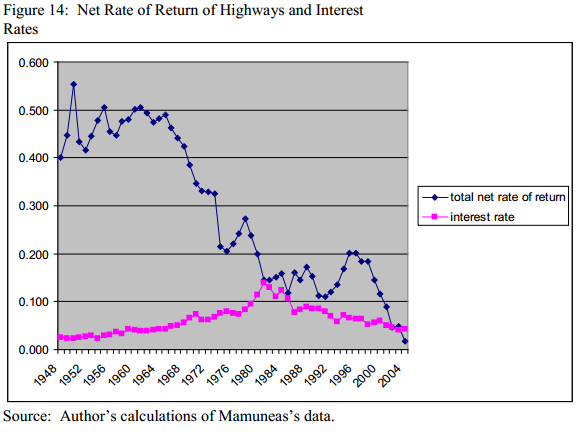Every couple of weeks, we hear about a $680 million shortfall in the transportation fund. The unspoken premise being that the projects that are creating the need that exceeds what the gas tax brings in are demonstrably worth the investment. So what is the return on highway investment nowadays?
Go ahead, make a guess. And keep in mind, if that return is lower than the return of leaving the money in the pockets of taxpayers, then we are actually stifling the economy by taking money away from taxpayers and putting it into highways in that scenario.
So what do the studies say? Well, in 2009 there was a review of a wide range of studies. All the studies show that the return has been declining steadily since the 1960’s. The most detailed study suggests the rate of return for federal highway investments may have dropped below the return of leaving the money in the private sector in 2005:
Road lovers will inevitably find fault with my conclusion and cite the last paragraphs of the report that suggest some highway spending might be justified in terms of maintenance. And to a certain degree, I agree that maintenance is a constructive use for taxpayer money. So no, I am not suggesting we let the streets turn into fields of potholes. What this suggests is we stop expanding highways and focus on maintaining what we have today.
Road lovers might also suggest that this is a federal study and we are talking about state and local roads. Well, I have news for you: Federal data suggest that state and local roads have a lower return than federal highways.
An automobile enthusiast might also argue that with interest rates being relatively low, that maybe the returns have has increased since 2005. The things is that as of 2005, the rising cost of oil has driven road construction costs up too – so at best we would break even between the cost of borrowing and the increased cost of construction.
In a last stand of desperation, the determined motorist might cite the Transportation Policy and Finance committee’s recommendations for increased funding. What you may not realize is that before the TPF got very far (Nov 2, 2011 to be precise), the Transportation Projects Committee, chaired by the Governor, approved an array of expansion projects which pretty much constitute the source of the “shortfall”. So the deck was pretty much stacked before the TPF held its first informational session. If you pick up the video on Wisconsin Eye, you can watch then WISDOT Chief Economist Mark Wolfgram outline how projections of traffic levels warrant the expansions that were then passed unanimously without question.
“Aha” I hear the road lovers say, “WISDOT PROVED the expansions were needed. ”
Well, not really. See, WISDOT’s projections are designed more for competing for federal dollars than for being an accurate measure of traffic, according to a recent report by 1000 Friends of Wisconsin.
Ok, now anyone who supports highways might be thinking that this really doesn’t matter – there’s a big election coming and what the focus is on right now is jobs and job creation. Oh, did I mention that the return on investment in highways is probably below the return on investment of leaving the money in the private sector?
See, this is why the media needs to dig deeper into this topic. We have a candidate for Governor who is dead set in favor of throwing more money into highways, and a Constitutional Amendment to vote on whose purpose is to make taxpayers amenable to making that happen. This is important stuff that will affect the long term economy of the state. I am sorry that it is not exciting enough to achieve the status of “focus of the election.” Maybe that is because it hasn’t been covered in enough detail yet?
Follow me on twitter: @FLTranspoDesk
Got a transportation story I should cover? Send it to me!








I wish it were possible to break out expansion vs maintenance in some fashion. I did note the reference to Fraumeni 2009 paper in reference to pavement efficiency… but how much does that interplay with the lower returns of non-interstate and local roads. Granted, it is quite likely I missed something in a quick read of a 30+ page document.
Ron,
I got an estimate of $200 mil (out of about $1 bil) just for the extra lanes on the Zoo Interchange project that is now underway. There are certainly a number of potential reasons why the return has been dropping, but no study has pinpointed it down to one component or the other. The thing is, expansions are probably the easiest place to look for starters. We do know that WISDOT regularly over-projects its traffic levels. Those over-projections end up skewing the scoring in Admin Code Trans-210 (major highway enumeration rules) away from the economic component of the score. Cuts in maintenance or downgrading of existing highway stock to achieve savings are potentially more politically unpalatable than limiting expansions.
Ron,
I got an estimate of $200 mil (out of about $1 bil) just for the extra lanes on the Zoo Interchange project that is now underway. There are certainly a number of potential reasons why the return has been dropping, but no study has pinpointed it down to one component or the other. The thing is, expansions are probably the easiest place to look for starters. We do know that WISDOT regularly over-projects its traffic levels. Those over-projections end up skewing the scoring in Admin Code Trans-210 (major highway enumeration rules) away from the economic component of the score. Cuts in maintenance or downgrading of existing highway stock to achieve savings are potentially more politically unpalatable than limiting expansions.
Back in 2009, a raft of studies on optimal stimulus spending came out. At the time, one of the least productive uses was discovered to be highway expansion projects. Maintenance scored much higher:
A review in 2011 confirmed the findings:
http://www.smartgrowthamerica.org/2011/02/04/new-report-reveals-smart-transportation-spending-creates-jobs-grows-the-economy/